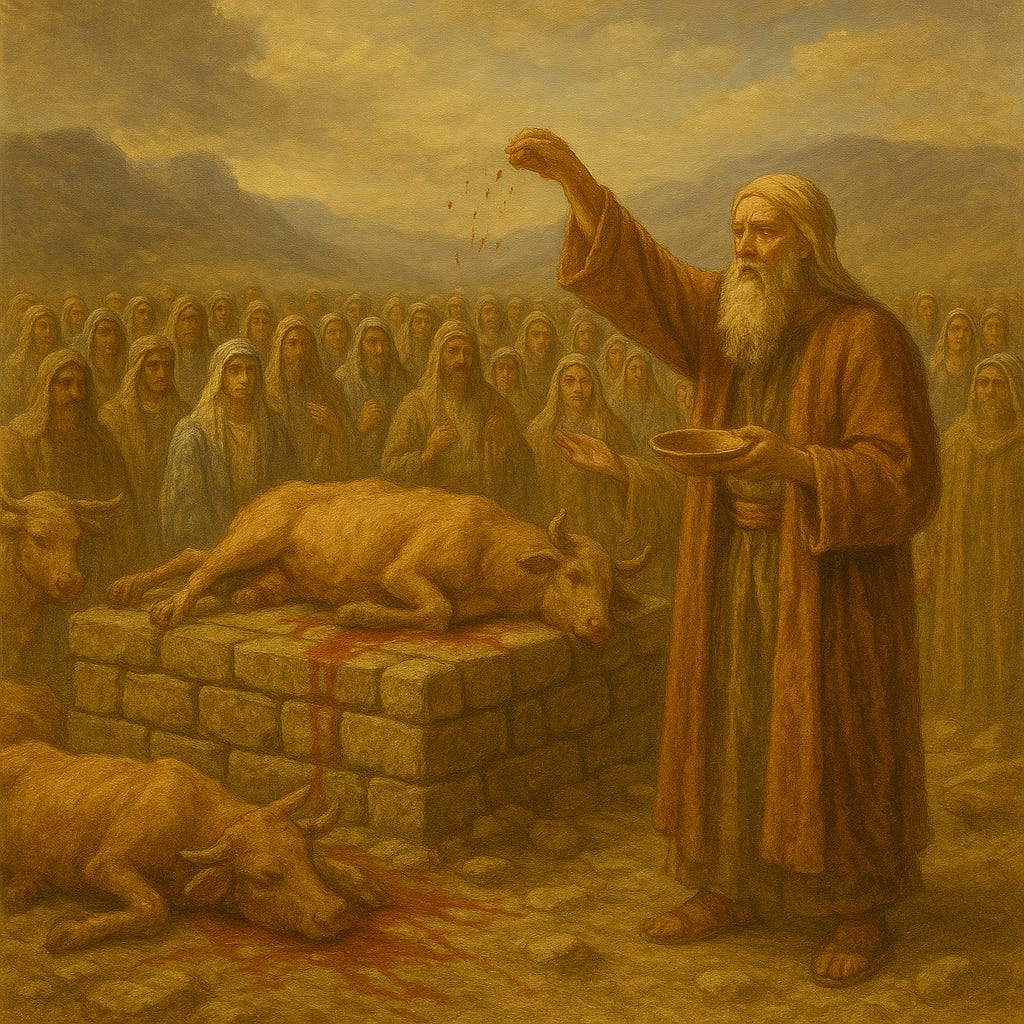The Better Sacrifice and Covenant Fulfilled
A reflection on Exodus 24
When we witness a wedding, we see more than a ceremony and legal proceeding. We witness vows spoken, promises written, witnesses gathered, and a bond sealed — a public declaration of lifelong devotion. The covenant God established with Israel at Mount Sinai was something like that, yet infinitely more.
As described in Exodus 24, it included spoken and written conditions, solemn oaths, witnesses, a ratified agreement, symbolic acts, and a celebratory meal. God said, “You will be my people,” and Israel responded three times, “All that the Lord has spoken we will do.” It was at once legal and relational — a holy betrothal of God to a people He had called His “treasured possession” (Exodus 19:5–6). But unlike any wedding we’ve attended, this covenant ceremony was sealed with the sacrifice of oxen and the sprinkling of blood on the altar and on the people.
What happened that day, roughly 3,500 years ago, was nothing less than heaven touching earth. The holy things of God — His Law, His presence, His glory — were revealed to a people marred by sin, still bearing the mark of humanity’s first rebellion in the Garden. As Paul would later describe, we are “jars of clay”: fragile, imperfect, unworthy vessels. Yet God, in His mercy, made a way for union. Sacrifice and purification were not optional formalities; they were essential. Without the shedding of blood there is no forgiveness of sins (Hebrews 9:22). Without cleansing, there is no communion.
Jacob once dreamed of a ladder reaching from earth to heaven, with angels ascending and descending — a picture of divine exchange, heaven’s life flowing down and earth’s praise rising up. At Sinai, the blood of the covenant became that bridge. The Almighty stooped to meet with His people, and through the shedding of blood, He made the unholy holy. In that moment, fellowship with the living God was not only possible — it was intimate, personal, and shared in His very presence. It was a glimpse of the prayer Jesus would later teach His disciples: “Your kingdom come, your will be done, on earth as it is in heaven.” At Sinai, heaven’s purposes broke into earth’s corruption, and God’s will was enacted among His people.
Yet God’s redemptive covenant plan began much earlier — in the Garden of Eden, moments after the fall. God pronounced judgment on the serpent, declaring that the offspring of the woman “shall bruise your head, and you shall bruise his heel” (Genesis 3:15). This was the first gospel promise: Satan would one day be crushed and defeated by Jesus, who would be “pierced for our transgressions” (Isaiah 53:5).
Centuries later, God’s covenant plan advanced through a bilateral agreement with one man, Abram. At the ripe old age of ninety-nine, God promised to make him the father of many nations and to bless all the families of the earth through him. Then, some 430 years later, God extended His covenant promises from one man to one nation (Israel) at Mount Sinai. He revealed Himself to a people freshly delivered from slavery, giving them His law — a moral and civil framework that revealed His character, exposed sin, and pointed to the need for a Redeemer.
But the covenant at Sinai was never meant to be the final chapter. Some 600 years later, God spoke through Jeremiah of a day when His law would not be written on tablets of stone but on human hearts:
“For this is the covenant that I will make with the house of Israel after those days, declares the Lord: I will put my law within them, and I will write it on their hearts. And I will be their God, and they shall be my people.” (Jeremiah 31:33)
This prophecy was fulfilled at Calvary, where God’s covenant of grace reached further still — from one nation to all people (Hebrews 8:10). In Jesus, both the Abrahamic and Sinai covenants found their ultimate fulfillment. The Old Covenants were inaugurated with the blood of animals; the New Covenant, with the blood of Christ — the better sacrifice that cleanses us from sin and secures our salvation forever. Even Samuel, looking through the lens of the Old Covenant, recognized the limited atoning value of animal sacrifice when he confronted Saul’s disobedience:
“Has the Lord as great delight in burnt offerings and sacrifices, as in obeying the voice of the Lord? Behold, to obey is better than sacrifice, and to listen than the fat of rams.” (1 Samuel 15:22)
At the cross, through the blood of Christ, God claimed people from every nation, tribe, and tongue. God’s covenants are never casual — they are public, sacred, and binding. Through Christ’s blood, we are invited into covenant fellowship with the Father: to hear His Word, affirm His call, submit to His lordship, and feast in His presence forever.
As believers, we have been brought from death to life, set free from sin, and clothed in the righteousness of Christ. “The law of the Spirit of life has set you free in Christ Jesus from the law of sin and death” (Romans 8:2). God’s love and grace prevail!
At Sinai, the covenant ratification was followed by a mountaintop meal. Moses, Aaron, the seventy elders, and others ascended, saw the God of Israel, and ate and drank in His presence — a celebration of fellowship made possible by the blood of the covenant. In the same way, the New Covenant looks forward to its own great feast.
The return of Jesus Christ and the marriage supper of the Lamb are coming. We, His bride, must be clothed and ready — for the ceremony is near, the Bridegroom awaits, and He is worthy.




To God be the glory!